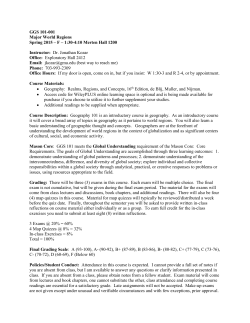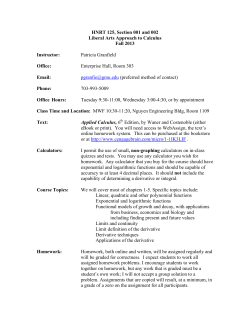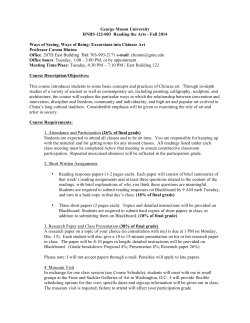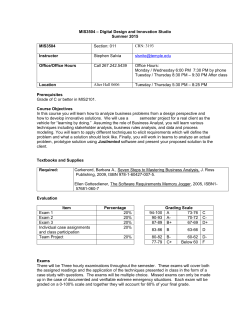
Syllabus - Honors College
Honors 122 | Reading the Arts Spring 2015 | TR 9:00-10:15am | Art and Design Building 1020 Instructor: Heather Anderson | Enterprise Hall Room 308| handers4@gmu.edu Office hours: By appointment (email me to set up an appointment) Texts (Required): • Reading Assignments as assigned (please see class schedule for readings and all readings will be posted to the class Blackboard site) Costs (Required): • Printing (standard stuff like readings and papers) • Memory Stick (1GB or more) Course Description: This experimental course is a hybrid. It includes a lecture/classroom component and recitation/studio component. The course will explore the history of photography and photographic manipulation before and after the use of digital photography and image manipulation software, as well as developing an understanding of basic Photoshop skills. Both portions of the course assume little to no knowledge of the history of photography or Photoshop. Course Objectives: During this course students will: • Develop and demonstrate knowledge of visual art, specifically manipulated photography, and its historical context • Develop and demonstrate knowledge of Photoshop • Develop and demonstrate research, writing, discussion and presentation skills • Develop and demonstrate critical thinking skills Readings: Students will be given specific reading assignments which they will be expected to have read before class. Failure to do so will greatly compromise students’ ability to comprehend lecture material and, consequently, to do well on class writings, quizzes, papers and in-class activities. Software Access: To access Photoshop outside of the scheduled class time visit the Mason Student Technology Assistance and Resource (STAR) Lab on the second floor of the Johnson Center, room 229. Since this lab is not 24-hours access please plan the time you need to work on your assignments accordingly. Email Access: Be sure to access your GMU account and to have your GMU email forwarded to any other email account you might use. I will only send information about this course to your official GMU email account. Late Work: Late work will be accepted, but the grade for the assignment will be dropped one full letter grade for every business day it is late. Work is always due at the beginning of class (with the exception of inclass assignments). If it is not turned in at the beginning of class, it is considered one business day late. Attendance: Attendance is of utmost importance if you wish to do well in this course. The ability to comprehend, analyze, and summarize lecture material (as well as visual and written material) will be crucial for the creation of critical analysis of the artwork we will review in class. It will not be possible to reconstruct lectures from the assigned readings. Students are expected to come to class prepared to work during in-class studio sessions. Students are responsible for all information given during class meetings. I recommend that you exchange contact information with a fellow student so that if you need to miss class for some reason you will be able to get an update on due dates and the lecture and discussions for that day. If you do have a medical or family emergency or feel that you are having difficulty keeping up with course requirements please contact me as soon as possible. Participation: Participation is a vital part of this course. It is not only part of your grade, but also an important part of the learning experience. Students are expected to come prepared to discuss the courses readings and subjects covered in class with well-thought-out and examined questions and comments. Students will also be expected to bring materials to class on studio days so that they can work for the entire course period. Class Conduct and Course Content: This class will include material that some students may find controversial or offensive. If you have concerns about the content of the course, please see me during the first two weeks of the semester. If you do not come to see me about your concerns within the first two weeks of the semester, I will assume you are comfortable with the course content and are prepared to complete all assignments, do all readings, and attend all lectures as laid out in the syllabus, readings, and course schedule. Because of the potential sensitive nature of the course contents, it is important that in-class discussions and any work generated for the course be respectful and conducted in a professional manner. Honor Code and Academic Honesty: When submitting work under your own name, please keep in mind that plagiarism is a violation of the GMU Honor Code. Plagiarism means using words, opinions, or factual information from another person without giving the person credit. If you use another person’s ideas or information you must cite, using standard citation format, all sources that your own writing draws on, either directly or indirectly. Also note that un-cited sources will constitute plagiarism even if they ended up in your work without your conscious knowledge (for example, you forgot you read the material or you confused your own notes with notes on a source), since part of the scholarly responsibility that comes with using secondary sources is keeping track of which words or ideas were yours and which came from another source. The George Mason University Honors Code will be followed for this course. Please see the University Catalog for a full description of the Code. Disability Accommodations: Reasonable accommodations are available for students who have a documented disability. Please contact Disability Services if you require accommodations: Office of Disability Services Student Union Building 1, Room 222 Phone: 703.993.2474 Grading: • Participation and Quizzes: 10% • Exercises: 20% • Mid-Term: 20% • Final Project: 50% o Photoshop Project, The Image: 10% o Final Presentation: 10% o Final Paper: 30%
© Copyright 2025





















